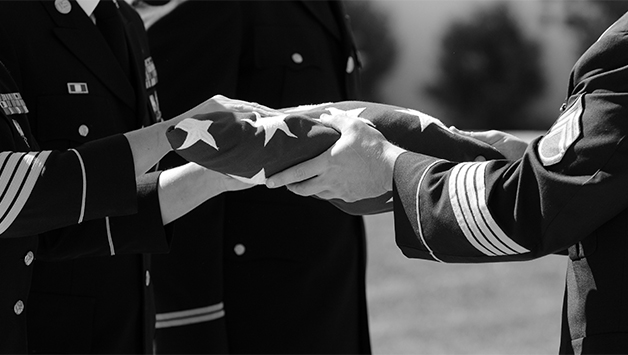
Whether you’re preplanning your own military funeral or making arrangements for a veteran who has passed, remember to research the benefits that are available to you. A variety of U.S. government programs honor and aid service members and their survivors.
Government funds are available to assist with veterans’ funeral expenses, and free services and programs support relatives left behind. But military benefits may not cover everything. If you’re preplanning, you may want to consider Preneed Funeral insurance to protect your family from undue financial stress during the grieving process.
The Department of Veterans Affairs (VA) offers free bereavement counseling to families who’ve lost a loved one on active military duty. Spouses, children, and parents of service members, reservists, and National Guard soldiers are eligible for this program to look after their emotional and psychological well-being.
Grief support for families of discharged military personnel can be found through dedicated nonprofit organizations. For example, the Tragedy Assistance Program for Survivors (TAPS) serves anyone who has lost a military loved one, regardless of their relationship to the deceased or the circumstances of the death.
All active service members and veterans who did not receive a dishonorable discharge are entitled to free military funeral honors. That is regardless of rank and includes veterans who served in the Selected Reserves, and anyone discharged due to disability. The ceremony involves draping an American flag over the casket or beside the urn, and after Taps is played, two uniformed military personnel will honor the veteran by folding the flag and presenting it to the next of kin. Your funeral director can arrange this ceremony upon request.
If you’re the surviving spouse, designated family representative, or the legal executor of a veteran’s estate, the VA may provide you with an allowance to help pay for your loved one’s burial, plot, and funeral costs. The amount you receive is dependent on whether the death was connected to service, if the deceased was hospitalized by the VA, and other factors.
Most veterans will qualify for a free burial in a VA national cemetery, provided they weren’t dishonorably discharged. National cemetery benefits include the opening and closing of the grave, a burial liner provided by the government, a headstone or grave marker, and perpetual care of the gravesite. Interment of an eligible veteran is authorized in any of the national cemeteries the VA maintains across the country.
VA national cemetery plots can’t be reserved in advance. Final arrangements can only be made through a funeral home after the veteran has passed. However, it’s possible to clarify your eligibility in advance by applying for a preneed determination of eligibility. The preneed determination applies only to national cemeteries. If you’d prefer to be buried in a state or tribal veterans’ cemetery, contact the specific cemetery directly to discuss options.
Even if you choose to be buried in a private cemetery, the VA will furnish a veteran’s headstone or grave marker to your family at no cost. Headstones and markers in bronze, granite, or marble are available. If you decide to purchase your own headstone or marker, you can request a free bronze medallion to affix to it. Medallions are inscribed with the word “Veteran” at the top and include the individual’s branch of service at the bottom. You can also request a Presidential Memorial Certificate, commemorating the late veteran’s service, as a keepsake.
To secure any military benefits, families will need to produce their service member’s military discharge papers, a copy of the veteran’s death certificate, and any receipts for the cost of transporting the body.
If you’re a veteran, you can help your family by locating your discharge papers now and letting your loved ones know where you’ve stored them.
Active duty service members serving in the Army, Navy, Air Force, Marines, and Coast Guard are automatically enrolled in a military life insurance plan, known as Servicemembers Group Life Insurance (SGLI). Some National Guard personnel and other categories of service members also qualify. When individuals are discharged from the military, they can apply to convert the SGLI to Veterans Groups Life Insurance or a commercial policy.
If you’re preplanning and want to be sure you’re well prepared, you may want to consider Preneed Funeral insurance. When you create a Preneed policy, you consult directly with funeral home staff to determine in advance what kind of military service and burial you would like. The funeral home tallies the costs for your wishes, and a policy is written that covers that amount. At the time of your death, the insurance company makes a payment directly to the funeral home to cover the funeral expenses. Planning the details yourself gives you an opportunity to determine how you’ll be remembered at your military funeral and alleviate the financial burden for your family.
Download a free veterans memorial funeral planning guide >
Wellabe provides Preneed Funeral insurance not only to help you make your final wishes clear, but also to leave no expenses behind for your loved ones. Call 800-995-9010 or visit our regional managers page to connect with a funeral home partner near you.
Download a free funeral planning guide >
Photo credit: iStock
Wellabe offers life and supplemental health insurance plans to help you prepare for good days and bad. We’ll always be here to empower you to be well — well prepared, well protected, and well loved.